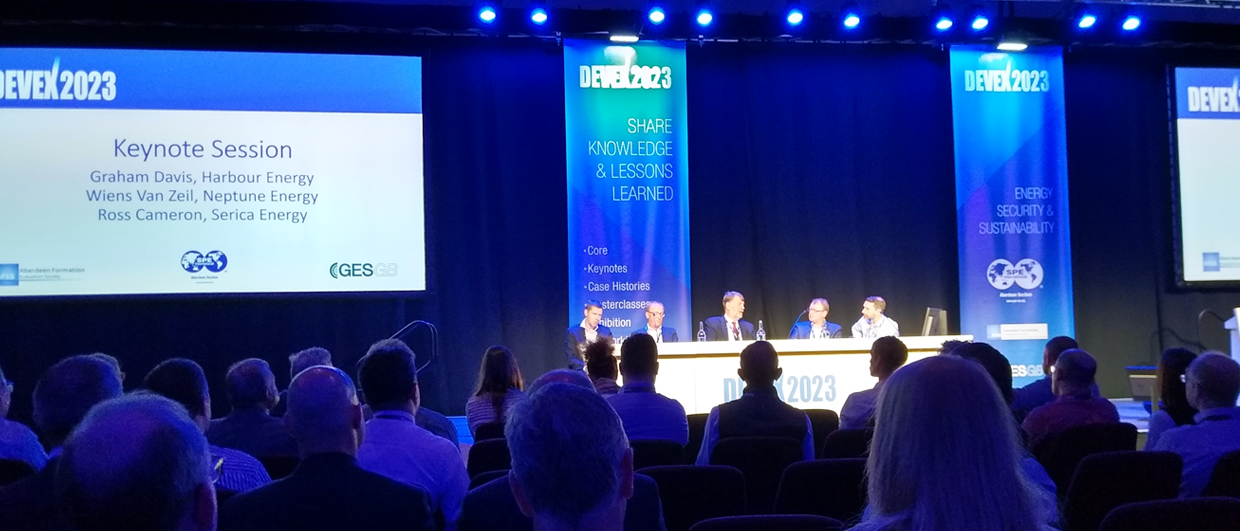Twenty years ago, the first edition of Devex took place in Aberdeen. At the time, the conference revolved around extending the life of oil and gas fields. “Not much has changed in that regard”, concluded Graham Davis during the opening session this week. Davis is the chief petrophysicist at Harbour Energy – I hope he still is after Harbour cut 1/3 of its geoscience workforce this week – and was one of the driving forces behind putting the initial Devex conferences together.
What has changed though is the gradual decline of talks on exploration. As Ross Cameron from Serica noted: “There is only one talk on exploration at this conference and that is one about the global scene. It is a sign of the times.” And the first take-away message for Labour leader Keir Starmer, who confirmed this week to stop granting licences to explore for oil and gas in the UK.
Unexplored parts of old fields
When it comes to extending field lives, there were a couple of good examples presented during the conference.
Rachael Crowe from Apache showed that a reprocessed survey from PGS across the greater Buckland field de-risked a fault panel along the western side of the field. Combined with a dynamic modelling exercise that suggested this panel was probably undrained, a new development well was drilled last year. The well came in to prognosis and has delivered a healthy boost to Buckland’s daily production.
Peter Wood and Kevin Angus from Harbour Energy showed another good example of in-field drilling in the Everest field. They illustrated how the 30-year operational legacy of the field had caused anchoring towards the idea that the northern part was not worth looking at for further drilling because of an anticipated poorly developed Paleocene reservoir. However, with a fresh look at the geological setting and the help of – again – dynamic modelling, a picture emerged that there was potential indeed. Despite challenges along the way, the newly drilled well has already resulted in the delivery of an additional 3 MMboe.
Based on these presented examples, Sir Keir could have concluded that drilling activity in the North Sea is really focused on squeezing those last barrels out of existing fields. By doing so, he would not have been too far off the mark as to what is the dominant way of adding resources on the UKCS even though some exploration is still taking place as well – albeit not being very successful at the moment.
CO2 footprint
David Moseley from Welligence put another perspective on maturing assets in the North Sea though. Something that could cast some doubt on Labour’s stance.
As a result of the rapidly declining production from mature assets, the CO2 footprint per produced barrel across the North Sea will only rise further – from around 50 kg CO2/barrel towards around 100 in the late 2030’s. At the same time, new developments such as Cambo or Rosebank are projected to produce around 10 kg CO2/barrel. In contrast, similarly old assets such as Statfjord in the Norwegian sector are currently at around 25 kg CO2/barrel. In other words, it is the old assets with the big old platforms that form the low hanging fruit when it comes to reducing emissions related to oil and gas production on the UKCS.
Welcome next year
Based on these observations, it is worth asking the question how much oil and gas is being left in the ground due to a potential ban on future oil and gas licensing. There are regional differences across the UKCS, with the West of Shetland offering more potential than the Southern North Sea, but the idea that a ban would leave many big discoveries undeveloped is looking unlikely. It’s also what the industry is aware of, given the focus on drilling in core areas in recent years, even decades, and a lack of sizeable discoveries during that time.
The proposed ban is therefore not too dissimilar to the one that Denmark introduced a few years ago; it comes too late to make a material impact on producing more hydrocarbons from the UKCS. The industry is aware of that, despite all the noise.
Instead, it would have been much more effective if Labour had a plan to incentivize cessation of production of the oldest assets whilst keeping the door open potentially find a new field that can be produced at a much more efficient footprint, acknowledging that the UK still needs oil and gas for the foreseeable future. But it is a message that is probably too difficult to “sell”.
In other words, I think it is still unlikely that Sir Keir is going to change his mind, but he is more than welcome to join next year’s Devex Conference to inform himself on the current state of play.




